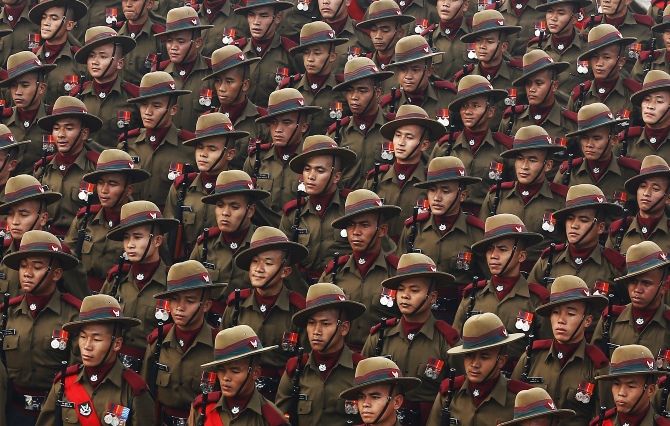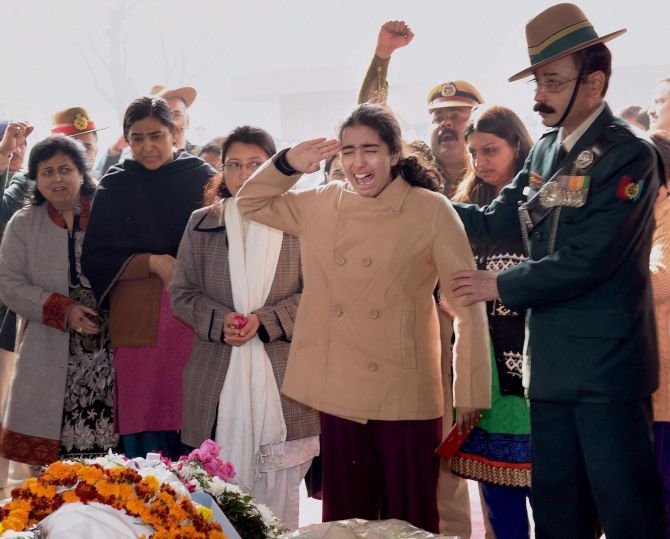'The vocal pacifists who monopolise the media in India need to answer a simple question: Would they have the Taliban or ISIS take over Kashmir or the rest of the country or let the army do its duty so that we are safe in our beds and free to demonise the soldiers in our cozy drawing rooms and television studios,' asks Colonel Anil A Athale (retd).

It was only the second time in my life (the first time was when I returned from a Pakistani Prisoner of War camp in 1972) that I broke down and had difficulty controlling my tears.
On March 16, I was in Hyderabad to celebrate Cassino Day and the bicentenary of my regiment, the 9 Gorkha Rifles.
Retired Subedar Rudra Bahadur of my company took me to meet the widow of Sepoy (Rifleman) Bhakta Bahadur, and the memories of the 1971 war came flooding in. It was an emotional tsunami!
99 Bhakta Bahadur was once my Batman (orderly, Sahayak and now christened Buddy). A silent type, he hardly spoke much but smiled often.
He was my treasurer (looked after my money and controlled my spending), admonished me on my laziness in writing to my parents and made sure I did not smoke too much by rationing my cigarette quota!
I had a policy of changing my orderly every six months or so in order to make sure that the jawan's career did not suffer.
Before him there was 83 Ram Bahadur, Chandra Bahadur, Rudra Bahadur and 17 Chandra Bahadur!
Readers may wonder why the numbers are suffixed to the names. Well, the problem among the Gorkhas is that there are, at any given time, scores of Sher Bahadurs, Ram Bahadurs, Bhim Bahadurs etc.
In order to remember men, one remembered their numbers. Not just officers but even the jawans' wives often would call their husbands by their numbers!
I was taken as a prisoner in the 1971 war while on a patrol inside enemy territory. It was a tense time for the battalion as at the same time one of our platoons was ambushed and we lost nearly 14 men.
As the news that I had gone missing in enemy territory reached my battalion, they feared the worst.
I was presumed to have been killed in action. As the battalion launched a successful attack on the Pakistani enclave at the Dera Baba Nanak bridge on the Punjab border, all of my ex-orderlies were extra motivated because they wanted to avenge their Sahib's death.
Out of these five jawans, one died in action while three, including Ram Bahadur and Bhakta Bahadur, were wounded.
Bhakta Bahadur had a spinal injury with a bullet wedged in his body, too dangerous to remove. It was this injury that ultimately took his life.
99 Bhakta Bahadur was boarded out of the service due to his injury in 1973. He was 25.
When I met his widow on March 16, all the memories of these loyal soldiers came flooding back to me.
Here I was hale and hearty, but my men who went beyond the call of duty were either maimed for life or dead!
I felt responsible in an indirect way and wondered would I be as loyal? Weren't these magnificent men better than me?
The only sense of satisfaction was that yes, the widows were well looked after and I had the privilege to meet them and express my gratitude.
Some readers may wonder why this rambling account of a personal encounter deserves a place on a public platform. Well, this is an attempt to set the record straight on many issues being raised in the media concerning the armed forces and especially the buddy system or even mundane issues like the quality of food in a jawan's mess.
The negative slant to all these stories is, of course, motivated by the need to get TRPs at any cost. Sometimes one really wonders at the IQ level and the 'real' intent behind these stories.
As to the bunkum about the food quality complaint by a habitual offender, one wonders if these worthies have ever seen the inside of a student hostel mess and the plethora of food- related complaints that are normal in any place where mass cooking is the norm.
The 9 Gorkha Rifles is one of the finest regiments of the Indian Army.
During the Second World War, this was the only battalion that captured a feature called 'Hangman's Hill' near the Cassino monastery in Italy, where the Americans and the British had failed to make any headway.The battalion faced the elite paratroopers of the German army.
Post-Independence, the battalion fought in 1947-1948 in Jammu and Kashmir, was on the forefront on the Namkachu river against the Chinese in 1962 and faced Pakistan's first armoured division in Khem Karan in 1965.
In 1971 we captured the Dera Baba Nanak bridge. The battalion has done two stints in Kashmir since then.

I have heard many murmurs of dissent by some fellow officers of other regiments as to when there is so much unemployment in India, why must we enroll Gorkhas?
The simple retort to this is we recruit soldiers to fight and win wars and not to solve unemployment problems. Other soldiers are indeed good no doubt, but the Gorkhas are the best.
Nothing embodies the spirit of the nation better than the brave daughter of the late Colonel M N Rai of my regiment.
On January 30, 2015, eleven-year-old Alka, his daughter overcame her personal grief and let out our war cry -- 'Jai Maha Kali! Ayo Gorkhali!
Colonel Rai, an officer of the 2/9 Gurkha Rifles, was commanding the 42 Rashtriya Rifles when he was killed by terrorists treacherously as he attempted to get them to surrender rather than kill.
The atmosphere of extreme pacifism has blinded us to the reality that a soldier is not an assassin or a hired killer. He fights at grave risk to himself to do his Dharma.
A soldier does not hate the enemy and understands that the other soldier is also doing his duty, but will nevertheless have no qualms in killing the opponent.
The Rules of War follow a simple dictum: Kill or get killed.
The vocal pacifists who monopolise the media in India need to answer a simple question: Would they have the Taliban or ISIS take over Kashmir or the rest of the country or let the army do its duty so that we are safe in our beds and free to demonise the soldiers in our cozy drawing rooms and television studios?
Colonel Anil A Athale (retd) is a military historian and coordinator of the Pune-based think-tank Inpad.











 © 2025
© 2025